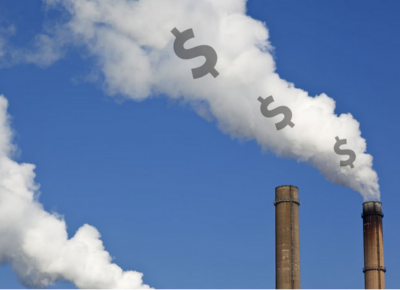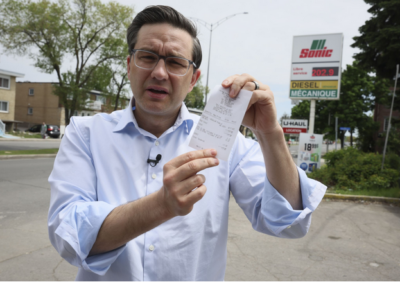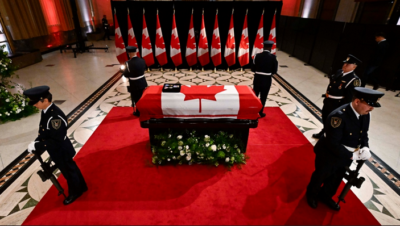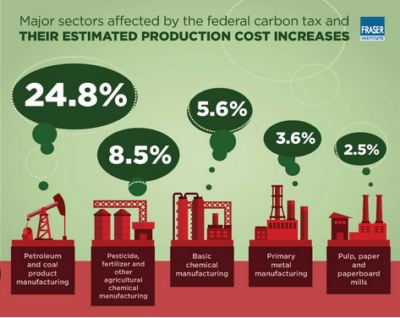March 22nd, 2024
BURLINGTON, ON
Despite all the noise from the official opposition on Parliament Hill, the truth is that carbon pricing contributes only a tiny fraction to the cost of inflation. Analysis shows that even when inflation peaked above eight per cent last year, carbon pricing might have accounted for a tiny one-54th of it.
 Carbon pricing does raise the cost of fossil fuels – that part is true. But even the latest round of scheduled progressive increases will have little impact on Canada’s declining inflation rate. And the carbon tax rebates are the great equalizer for Canadians facing higher food and other costs.
Carbon pricing does raise the cost of fossil fuels – that part is true. But even the latest round of scheduled progressive increases will have little impact on Canada’s declining inflation rate. And the carbon tax rebates are the great equalizer for Canadians facing higher food and other costs.
80% of Canadians are better off with the tax and the rebate than if the tax were axed, as Canada’s Conservatives would do were they to win the next election. In fact axing the tax would do almost nothing to lower inflation but everything to make the average Canadian worse off.
Alberta premier Smith and Saskatchewan premier Moe also support ‘axing the tax’ despite the fact that residents of those provinces receive the greatest annual carbon rebates ($1800 and $1500) while still paying some of the lowest energy prices in the country. Clearly partisanship and ideology trump economics in those prairie provinces.
 Mr. Poilievre believes he’s riding a winner with his ‘axe the tax’ campaign, a catchy though well-worn and somewhat dated slogan. His misrepresentations have started the Liberals calling him out as the liar he becomes when he speaks to the issue. But then again, his political party does not even recognize the reality of climate change, so he may just be carrying their water.
Mr. Poilievre believes he’s riding a winner with his ‘axe the tax’ campaign, a catchy though well-worn and somewhat dated slogan. His misrepresentations have started the Liberals calling him out as the liar he becomes when he speaks to the issue. But then again, his political party does not even recognize the reality of climate change, so he may just be carrying their water.
Affordability is the watch word these days. Initially Poilievre hung his hat on the mostly false claim that the federal deficit was the major cause of inflation But now he has resorted to another falsehood and set his gun sights on carbon pricing. He introduced a non-confidence motion in Parliament this past week, which could have forced an early election. But every other political party stood with the Trudeau crowd to defend carbon pricing.
Yet it is unfortunate that we are not having an election over how to mitigate Canada’s embarrassingly high carbon footprint. The politicians from every party except the one leading in the public opinion polls understand that this is the most cost-effective way to deal with one of the greatest existential threats to our planet. They get it.
 As we remember Brian Mulroney this week, we should also consider how he tried to resolve fractious public policy issues. The Charlestown referendum ultimately settled the matter of constitutional change once and for all, despite Mulroney losing. Canadians were informed on the issue and they told the PM that they preferred the status quo and a stronger federal government.
As we remember Brian Mulroney this week, we should also consider how he tried to resolve fractious public policy issues. The Charlestown referendum ultimately settled the matter of constitutional change once and for all, despite Mulroney losing. Canadians were informed on the issue and they told the PM that they preferred the status quo and a stronger federal government.
The 1988 election was largely about free trade with the US and Mulroney won that debate. There would be winners and losers but, despite the pain of adjusting to change, an informed Canadian public elected the party which supported freer trade with the Americans.
Trudeau may claim that he won the last two elections over the issue of his carbon tax – it was his signature policy after all. But not everyone agrees, including Mr. Poilievre and a significant number of provincial leaders. The sentiment among pundits is that Trudeau has failed to fully inform, sell and convince the public on the merits of carbon pricing. Even the Globe and Mail, long a strong supporter of carbon pricing, is getting ready to write off this entire experience as a failure.
So, what better way to bring the public up to speed than to put the choice directly in their hands. Mr. Trudeau should make the next election about climate change, or conduct a referendum to shut up the critics. Trudeau’s is currently light years behind in the polls. If that trend continues and the Tories win the next election climate policy including carbon pricing will all be history.
Does the PM’s miserable poll numbers mean that Canadians also disapprove of carbon pricing? Or does the Tory party’s staggering lead in public opinion polls say more about a fickle and bored public wanting to change the channel, as they did a few years ago in Ontario? That was a move which ended Ontario’s role as one of three provinces leading the fight against climate change.
Successful politicians are often those who aren’t afraid to show courage – Mulroney was one of those. Unfortunately the new leader of the provincial Liberals is playing footsie on this issue, afraid to take a stand in case she says the wrong thing before the dust has settled. She is currently the leader of a third party and sitting on the fence will rightly ensure that she stays exactly where she is.
 To end this on-going axe the tax partisan campaign Trudeau needs to answer the challenge and call the bluff. He needs to borrow a page from Mr. Mulroney’s book and make the next election a ‘climate change election’, if not now, certainly in 2025.
To end this on-going axe the tax partisan campaign Trudeau needs to answer the challenge and call the bluff. He needs to borrow a page from Mr. Mulroney’s book and make the next election a ‘climate change election’, if not now, certainly in 2025.
Following your own convictions and doing what you believe to be the right thing is not enough in a democracy. You need to have the public behind you. Trudeau needs to call Poilievre’s bluff and let an informed public finally decide on whether we need to continue with carbon pricing and the ultimate phase-out of fossil fuels in this country.
Trudeau needs to put an end to the prattling half-truths and outright lies pouring from the mouths of the opposition leader and his cabal of climate denying premiers once and for all. He needs to put the decision to fight for our future directly into the hands of an informed voting public.
 Ray Rivers, a Gazette Contributing Editor, writes regularly applying his more than 25 years as a federal bureaucrat to his thinking. Rivers was once a candidate for provincial office in Burlington. He was the founder of the Burlington citizen committee on sustainability at a time when climate warming was a hotly debated subject. Ray has a post graduate degree in economics that he earned at the University of Ottawa. Tweet @rayzrivers
Ray Rivers, a Gazette Contributing Editor, writes regularly applying his more than 25 years as a federal bureaucrat to his thinking. Rivers was once a candidate for provincial office in Burlington. He was the founder of the Burlington citizen committee on sustainability at a time when climate warming was a hotly debated subject. Ray has a post graduate degree in economics that he earned at the University of Ottawa. Tweet @rayzrivers
Background content
Non-Confidence – Carbon Price Baloney – Inflation and Carbon Pricing Carbon Pricing –
















Forgetting about the Liberal spin, Pierre’s axe the tax and the PBO for a minute. If you have ever been pick pocketed here is how it works. Hey look at that shiny object and budda bing your pockets are empty. The shiny object here being hey look some people are getting more, while the rest are getting less and we are supposed to be happy about it. The price on pollution a.k.a The Carbon Tax was meant to keep increasing the price of carbon based products until we decided it cost too much and shifted our buying habits to a less expensive and eco friendly alternative. Except there are not enough green alternatives to fill the gap. That being the case the government ploughed ahead and mandated that only EV’s could be produced after a certain year. The problem being they are only a band aid solution to a greater problem. If the The Carbon Tax is revenue neutral, watch your pocket because it is being picked.
Ray, where did you get your information for this article? Specifically your point that “80% of Canadians are better off with the tax and the rebate than if the tax were axed”? Everything that I have read says that ALL Canadians are paying more for everything they buy, after factoring in the rebates. According to the PBO report, the carbon tax cost the AVERAGE family $710 AFTER THE REBATES. This is an absolute scam. Taxing people and then giving them partial rebate and telling them they are “better off” is a complete lie.
Thanks for the article Ray. I had someone bring up the PBO’s report from 2023 that Poilievre likes to quote. It got me doing a bit of research. I found an article from the Canadian Climate Institute that discusses the flaws in the PBO report, most specifically that “…the PBO compares costs relative to a world in which Canada simply ignores its emissions—and faces no consequences…”
Furthermore, just 2 days ago the PBO appeared on the CBC Power and Politics show. I watched the 10 min excerpt from that video. I found both of these fairly easily with a Google search.
The PBO makes it clear in that interview that their findings have nuance. He clarified that Canadians only lose out when you look at the broader impacts on the economy. But as the CCI article pointed out, doing nothing has its own related costs. In the interview the PBO confirmed that “most families will still get more in rebates than they pay”. In the PBO’s own words, 80% of households are better off. He goes on to say that they compared “where we have a carbon tax vs. the absence of a carbon tax”. He doesn’t consider the cost of alternative solutions or the cost of worsening climate change for a decision to do nothing. One of the negative impacts he suggests could happen is “lower employment in the oil and gas sector”, which isn’t necessarily a undesirable result if we want less production and consumption of fossil fuels.
To the interviewer’s credit, he challenges the PBO on the exact criticism the CCI report levels at his report. The PBO clarifies that his mandate doesn’t include evaluating alternatives, just looking at what the government puts in place vs. if it was not there. The PBO agrees that “doing something else to reach international targets…would also have costs”. Later in the interview, when the interviewer says that he doesn’t include the cost impact of climate induced events, the PBO doesn’t disagree with that, but does explain how difficult it is to quantify those costs. He doesn’t seem to suggest the cost is zero. In my judgment that lends credibility to the CCI’s criticism. The PBO also clarifies that their report only looked at impacts up to 2030. Assuming transitions to a cleaner economy has benefits into the 2040s and 2050s, those are not a factor in the report from last year.
When asked if the carbon task was the least expensive and least intrusive option, he doesn’t offer his own opinion but cites that it’s the consensus among economists. I think he could have even said “I don’t know, I haven’t analyzed the other systems”, but I think relying on the opinion of leading economists is a good approach.
I get annoyed at Poilievre A) suggesting to people bear the total cost of the tax, B) they can get rid of the tax without getting rid of the rebate and C) proposing to remove a policy to fight the impacts of climate change and suggestion no alternative policies.
If 80% of Canadian’s are better off with the carbon tax, maybe we should double or even triple the carbon tax then? Would that mean double or triple the rebate for 80% of Canadians? This sounds like a fairy tale math to me.
If every day Canadian’s aren’t paying for the carbon tax then who is? Saying that “corporations” are paying is nonsense, they just increase the prices of groceries, transportation, utilities etc. and we pay more for everything we buy.
I agree with Ray, once. Lets have an election now. Canada needs to rid itself of this corrupt, incompetent government, axe the tax, slash the size of the cancerous ballooned civil service, significantly cap the numbers of newcomers and just maybe Canada can back to increased productivity, rising GDP per capita, prosperity & affordable food and home ownership.
Thanks for your comments all – it’s clear the Canadian public, if this is an accurate sampling has a long way to.
1. First of all Philip, you are right the federal carbon tax is not revenue neutral and some 10% is held back for administration and some ‘green’ project funding. In spite of that according the the independent Parliamentary Budget officer the rebates provide a net benefit to 80% of Canadians.
2. Second, it is too early to determine the impact of carbon pricing – the purpose of the tax is to incentivize change. That is happening but it is not linear in effectiveness, meaning most of that emissions reduction will happen later as the program steps up and folks are allowed time to substitute less carbon intensive production, goods and services. That is why the tax increases progressively.
Canadian EV sales, for example are still in the 5-6% range. And Doug Ford is forcing developers to install gas appliances in the new homes they build, delaying the uptake of cleaner technology. It will take time and increased price pressure to see the kinds of results we can expect from carbon pricing….and a refreshing change of political leadership in the province.
Ray, I understand that you have a degree in economics–perhaps you need to review a lesson once learned on elasticity. Does the carbon tax incentivize change? It might if there were reasonably priced alternatives to using gasoline and natural gas. BUT THERE AREN’T REASONABLE PRICED ALTERNATIVES–electric cars and heat pumps are expensive (we’ll leave aside the debate that this technology at present is unreliable in Canada) and out of reach for many Canadians; particularly when we know that at least half of Canada’s population are living paycheque to paycheque. The net result is that Canadians can’t afford to switch over and so the carbon tax has had very little impact on incentivizing change; instead, because the demand for natural gas and gasoline are inelastic, the carbon tax generates REVENUE for the government.
I doubt the PBO analysis takes into account both the DIRECT and INDIRECT carbon taxes that Canadians are paying. I’m a middle income resident of Burlington who owns his own home. The rebate doesn’t even cover my DIRECT CARBON TAXES on gasoline and home heating. If I add in the INDIRECT taxes I’m paying in the form of higher prices (including property taxes), then I’m out an estimated $750 per year AFTER rebate. Taxpayers should do their own careful analysis and see who is lying to Canadians–hint, it’s not Pierre!
It’s time to “Axe the CRAP”
Put an end to the endless whining of that wiener (not a winner), Pierre Poilievre and his bald faced lying rebranded:
Conservative
Reform
Alliance
Party
Conserving and conservation were core parts of the deservedly respected Progressive Conservative Party of Canada. This fake C party from Alberta assimilated the name and left the class behind. Let’s Axe The CRAP and see some policy with character & balls that doesn’t shovel more money into the bloated pork barrels of corrupt oil and Weston food oligarchies. Stuff the oil-igarchies, save long term energy costs with conservation, efficiency and renewables. Make Conservatives Green Again like in the Mulroney years. Axe The CRAP!
Yes Ray we should have a climate change election. Let’s start by examining how effective the carbon tax has been in reducing the emissions of greenhouse gases. In 2015, when Trudeau took office, GHG emissions were 764.5 mt.; by the end of 2022, those GHG emissions amounted to 756.8 mt. That’s a whopping reduction of about 1 mt per year, almost a rounding error. But wait, we’re not done–those emissions have been rising during 2021 and 2022 as the pandemic ended so that 2023 data if extrapolated will likely show GHG emissions that are an increase over 2015. And the Liberals claim that their program is effective in reducing emissions?
ttps://edgar.jrc.ec.europa.eu/report_2023#emissions_table
And at what cost, Ray? In a parliamentary committee meeting this week, one in which Chrystia Freeland REFUSED to answer questions, Michael Barrett revealed that the federal government has so far collected just over $20 billion in carbon taxes while returning just $18 billion in rebates (data from the Public Accounts). As a side note, Freeland had previously claimed that the Carbon Tax was revenue neutral which the data shows it is not (she LIED); I don’t know if the revenue data showed the HST charged on top of the carbon tax but if it didn’t, that would be an additional $2 billion in revenue. It appears that this obviously high-cost program, omitting for now the impact on inflation, has achieved ZERO in reduced emissions. A typical Trudeau policy–talk a good game, fail to deliver.
We can debate the impact of the carbon tax on inflation, its complex and it’s dynamic and one needs to dig into the actual calculations, line by line to fully understand the impact (not antidotal proclamations).
What is known a tax on energy affects just about everything you buy, right through the supply chain. And to make matters worse, GST is added on top of that. Anyone in business will know that a cost is not past directly to the customer, it is margined up. So, this cost gets multiplied and added to many times before it actually gets to the person buying the product – that’s a large part of what people are seeing at the grocery stores.
We know since Covid, the M2 money supply in Canada has increased from$1.8T to $2.5T as a result of Trudeau deficits.
So there are (2.5 – 1.8)/1.8 x 100 = 38.8% more Canadian dollars in circulation! This is driving inflation and masking the impact of the carbon tax. The money supply curve is starting to flatten (because borrowing is multiple times more expensive that Trudeau said it would be), and hence the carbon tax will have a larger contributing impact on inflation today than, say 1 year ago.
It’s not been reported, but I believe the Bank of Canada (BoC) is holding off on reducing interest rates to see how much more the money supply is expanded in the up coming budget, and the BOC knows the carbon tax increase on April 1 will also impact inflation.
To my second point, lets unpack the logic, 70% of Canadians no longer want the carbon tax. Seven of the provincial premiers have said that there should at least be a pause (note that Eby in BC has to follow the lead of the federal NDP and is in a bad spot on the carbon tax with falling poll numbers). So are all these Canadians wrong, are these elected officials wrong, we should believe a Trudeau government mired in half truths (I’m being generous here) and a scandal per week ramping up to two scandals per week?
Finally, bring on the election, however the coward Liberals and NDP voted against this knowing full well they would lose in a landslide, Jagmeet would not get his pension and their election “war chests” are in trouble.
Oh Ray. If logic ruled with the electorate, Canada would never have voted in a part-time, drama teacher with an entitlement attitude & nice hair in 2015 and beyond, to be our Prime Minister and arguably the worst in Canada’s history.
Justin Trudeau & his complicit Liberal government (incl. Karina Gould) is widely credited with at least 2 conflict of interest violations (i.e. luxury vacations on Bell Island/ Jamaica), blackface & Bollywood embarrassments, a SNC Lavalin scandal, an evolving ArriveCAN debacle, a largely ignored Chinese election interference plot, expansive immigration policies with no plan for added housing, education or healthcare, a divisive Atlantic heating oil cutout to Carbon Tax, 30% increase in Civil Service payroll with arguably less service (i.e. Passport interminable delays), and the list goes on. I rest my case.
Trudeau has to go. Plain & simple.
If the purpose of a carbon tax is to disincentivize us then how is giving us a rebate of more than we pay ever going to encourage people to lower their emissions? This is LiberalMath, coming from a Prime Minister who uses more carbon flying around the world than probably the whole province of New Brunswick or Nova Scotia. The same government who’s Minister of the Environment, a convicted criminal who was arrested for climbing onto Ralph Klein house in 2002 to install solar panels and also in 2001 again when he climbed the CN Tower, yet he calls Saskatchewan immoral for not protesting the carbon tax. In total he has been arrested 4 times.
The next election doesn’t need to be about carbon pricing, Pollievre will scrap the tax and the population will throw out the Liberals and their most open government ever (anyone else remember that campaign slogan from 2015)?
What a great idea, how about having that election now.
Here is a question worth answering, how many rebates dollars have contributed to more carbon use? For example how many recipients bought a carbon intensive flight to one of the PM’s favourite carbon intensive destinations. Or did they need their own rebated money to buy groceries? The Liberal party is over. Our social conscience knows we need to use less carbon, but not with this non-plan.
I like the carbon tax but there is a problem with the current legislation.
The problem is addressed in private member’s bill C-234 that has passed the house but not the senate.
“The legislation in question, Bill C-234, would exempt farmers from paying the federal carbon tax on propane and natural gas, when it is used to heat and cool barns and greenhouses, as well as for drying grains.”
“In the case of farming, the total cost of carbon taxes for growers range from $150,000 per year for an Ontario mushroom farm, to $100,000 for a poultry farm in Alberta and $10,000 for a 5,000 acre grain farm in Saskatchewan.”
https://energynow.ca/2024/02/canadian-farmers-want-carbon-tax-relief-and-what-it-means-for-you/#:~:text=Farmers%20say%20the%20carbon%20tax,real%20consequences%20for%20Canadian%20prosperity.
A mushroom farm has to heat the building it grows the mushrooms in but the fuel is not exempt from the carbon tax. A rancher has to heat the barn the cows live in but the fuel is not exempt. A chicken farmer … The greenhouse that grows strawberries in the winter …
“Canada’s greenhouse vegetable and mushroom sectors are an important part of Canadian agriculture and a source of significant economic activity within Canada, contributing $2.2 billion in farm gate sales and approximately $1.9 billion in exports in 2022.”
https://agriculture.canada.ca/en/sector/horticulture/reports/statistical-overview-canadian-greenhouse-vegetable-and-mushroom-industry-2022
Unlike the HST the carbon tax also directly hurts businesses trying to export by making the products less competitive.
Trudeau bought an oil pipeline for us.Time to get rid of this phoney .